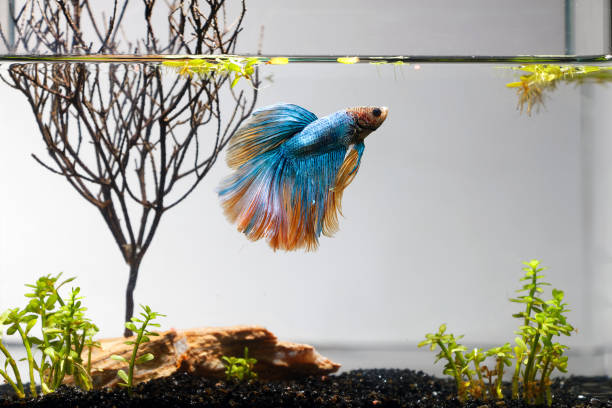How Do You Know if Your Betta Fish Is Unhealthy: Signs to Look Out for!
If you are concerned about your betta fish’s health, there are a few things you can do to check. First, look for any abnormalities or changes in the fish’s appearance. This could include anything from the protrusion of the scales on its body to changes in color or shape of its fins. Second, feel your betta fish’s body – if it is slimy or has a mucous coating, it may be unhealthy. Finally, take your betta fish to a qualified pet store or veterinarian for further examination and diagnosis.

Table of Contents
How to Tell if a Betta Fish Is Sick?
If you are concerned about your betta fish’s health, there are a few things you can do to check. First, take a look at its water quality. If it seems cloudy or has a bad odor, the fish may be sick. Second, observe the fish’s behavior. Here are some of the important things to consider:
Discoloration
If you notice that your betta fish’s color is fading, it may be time to take it to the vet. If the color of your fish has faded significantly, there may be a problem with its health. Some possible causes of poor health in betta fish can include parasites, disease, or malnutrition. If you notice any changes in your fish’s behavior or appearance, it is important to take it to the vet for a check-up as soon as possible.
Damaged Fins/Fin Rot
Betta fish are susceptible to a variety of diseases, including fin/tail rot and fungal infections. If you notice that your betta fish’s fins have been shredded, it may need a vet appointment. This is a sign that your betta has been attacked by another fish or parasite. If the fins have been shredded to such an extent that they are not usable, your betta may be unable to swim properly and might even die as a result.
White Spots and Parasites
Betta fish are typically very healthy, but if you notice white spots on their skin or parasites in their water, it’s important to take action. White spots can be a sign of disease or parasites, and if left untreated, can lead to death. Parasites can be removed using a good fish treatment program or by taking your fish to a veterinarian.
Enlarged Eyes
If you notice that one of your betta fish’s eyes is bulging, it may need a vet appointment. This can be a sign of two things – either an infection or damage to the eye itself. If the eye seems to have decreased vision, your betta may need surgery to fix the problem. Always consult with your veterinarian if you are concerned about any changes in your fish’s behavior or health.
Lethargy
If you notice that your betta fish is lethargic and doesn’t seem to be eating or swimming as much as usual, it may be time to take it to the vet. Some possible reasons for a fish’s lethargy include an infection or illness, malnutrition, or stress. Again, if changes in your fish’s behavior are apparent – such as loss of appetite or energy – it is important to consult with a veterinarian.
Excessive Hiding
If your betta fish starts to hide under the water or around the tank. This could be a sign that your fish is feeling scared or uncomfortable and might need some help getting back into shape. If you notice any injuries on your fish’s body, take it to the veterinarian for further evaluation.
Loss of Appetite
If your betta fish appears to be losing its appetite, it might be time to take it to the vet. Some potential causes of a lack of appetite in betta fish include an illness or parasite. If changes in your pet’s behavior are apparent – such as not eating or becoming lethargic – consult with a veterinarian.
Inactivity
If your betta fish is not swimming around as much or doesn’t seem to be exploring its surroundings, as usual, it might need some extra love. Changes in the routine can cause stress and can lead to an inactive lifestyle. If this is the case, try providing more hiding spots and interesting objects for your fish to explore.
Scratching
If your betta fish is scratching a lot, it might need some help adjusting to new surroundings or an altered diet. Some possible causes for this behavior include an infection or foreign object stuck in the fish’s skin. If you notice any changes in your pet’s normal behavior – such as lack of appetite or lethargy – consult with a veterinarian.
Swimming Behavior
If your betta fish is swimming in circles or not moving at all, it might be stressed out. Changes in the fish’s routine, such as changes to its environment (moving, new people/animals around), can cause stress and trigger this behavior.
Murky Tank
If your tank is appearing muddy and murky, it might be time to clean it. Drainage from plants or gravel can cause this type of water condition, while organic material (like plant matter) can settle over time and create a cloudy environment. If you’re experiencing these issues consistently, consult with a veterinarian about possible changes in your betta fish’s water conditions.
Surface Breathing
Some betta fish owners may notice that their fish are breathing through the surface of the water instead of using its gills. This is often a sign that the fish is stressed out or injured and may need to be treated. Some possible causes for this behavior include parasites, fungus, or diseases. If you notice your betta fish breathing through the surface of its tank, it is best to take it to a vet for a check-up.
Swelling and Dropsy
Swelling and dropsy are common signs of illness in betta fish. The swelling usually develops near the gills and can be accompanied by distortion of the skin, loss of appetite, weight loss, lethargy, and decreased swimming ability. If you observe these symptoms in your pet betta fish, it is important to take it to a veterinarian for diagnosis and treatment.

What to Do if You Think Your Betta Fish Is Sick?
If you think your betta fish is sick, the first thing to do is to take it to a qualified fish care specialist. If the fish seems lethargic or doesn’t seem to be eating or swimming as much as it should, it may be sick. There are a few different types of betta fish diseases that can affect them, so it’s important to get help from a professional if you’re not sure what’s wrong.
How to Prevent Your Betta Fish From Getting Sick
There are a few things that you can do to help prevent your betta fish from getting sick. First, make sure that their water is clean and well-maintained. Second, make sure that they have plenty of food and fresh water to drink. Finally, keep an eye on their health and if they start to look sick or act differently, take them to the vet as soon as possible.